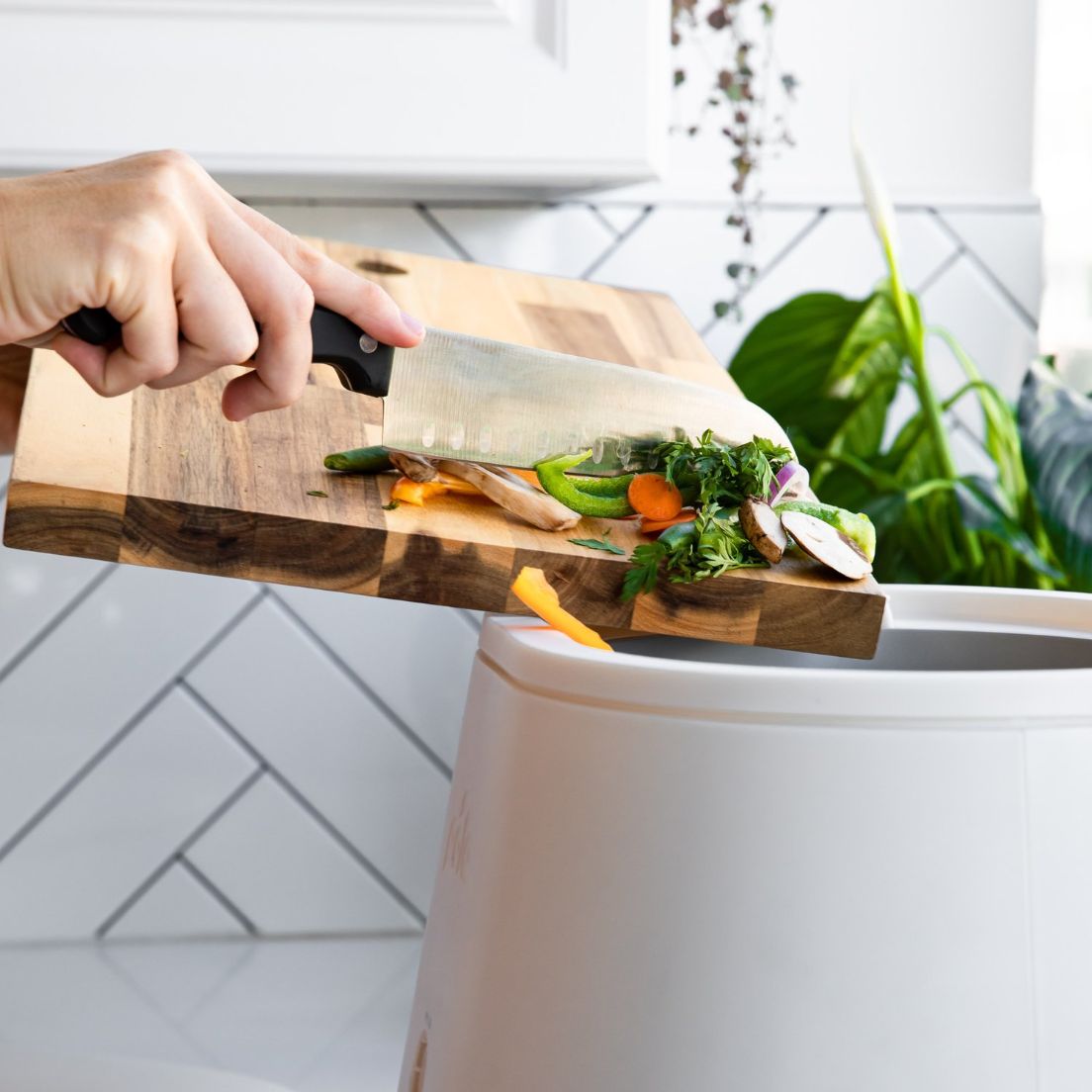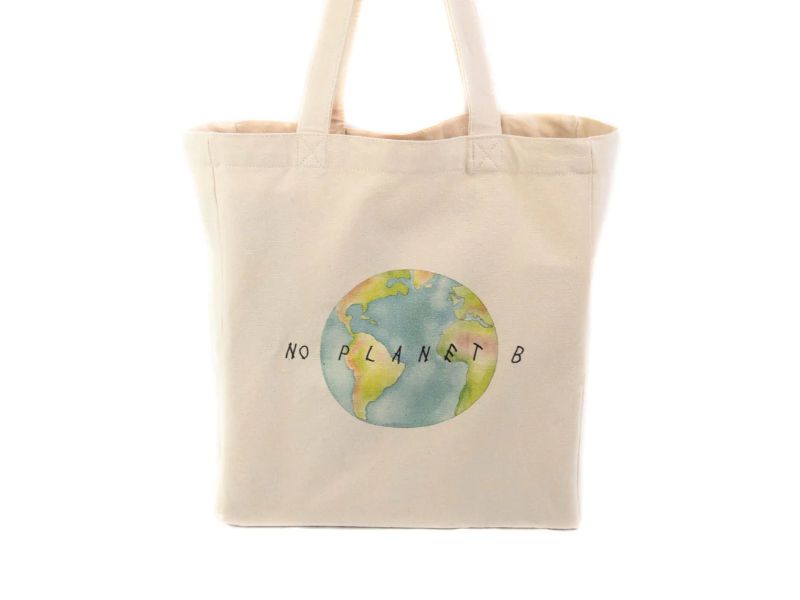
More and more products are being labeled as either biodegradable or compostable, but what do the terms biodegradable and compostable mean? Maybe you are new to composting or want to be more conscious of your purchases. Whatever the reason, it's important to have a general understanding of what these labels on your products mean so that you can avoid being greenwashed by companies. Here's a breakdown of the topics we are going to cover so you can skip ahead if you need to:
Table of contents
First, let's go over what the terms biodegradable and compostable mean in order to understand what materials can be categorized into them.
What does biodegradable mean?

Biodegradable materials can be broken down by fungi, bacteria, or any other type of biological process. Biodegrade means to break down (degrade) life (bio) and it's the natural process to return materials to their natural elements. Something like plastic will break down into carbon dioxide, water, and other elements.
Most things are considered biodegradable. Some companies use biodegradable plastics instead of petroleum-based plastic for their products. Bioplastics will eventually break down but these materials can take decades, if not centuries, to break down.
What does compostable mean?

Composting is when you allow organic materials to break down into fertilizer for your plants. The composting process is simply recycling organic waste so that you can reuse it later. This can be done in a traditional compost heap or an electric composter.
If a product is labeled as compostable material, it means that it is industrially compostable and not necessarily home compostable. Even compostable plastic will break down under the right conditions. Compostable products require a specific environment to break down and won't necessarily biodegrade naturally in a landfill.
Compostable vs biodegradable: what’s the difference?

Now that we understand the definitions of compostable materials and biodegradable vs compostable materials, it's pretty easy to see why the terms get so easily confused. All compostable material is biodegradable, but not all biodegradable material is compostable. A key difference between biodegradable and compostable products is that composting requires specific conditions in order to break down materials. Biodegradable materials will break down naturally, but they tend to take longer than the composting process.
Both biodegradable and compostable products are much better for the environment than products made of plastic because they don't take as long to break down. Compostable products degrade and don't leave any toxic residue because they are made of organic materials. Biodegradable products break down over the course of many years and can sometimes leave behind toxic waste. Many companies will label plant-based plastic products as biodegradable. Biodegradable plastic will break down faster than regular plastic and can be safer for the environment, but biodegradable plastic needs to have the right environmental factors or it could take as long as regular plastic.
Greenwashing: why it’s important to understand the difference

It is possible that you have heard the term greenwashing, but what does it mean? Greenwashing is when a company makes false or misleading statements about the sustainability of its product. Companies will often put more money into promoting how "green" or eco-friendly they are instead of putting that money into actually doing better for the planet. It might look like something like a company having recycling bins set up at their stores while continuing to sell products that are harmful to the environment. Or they might use compostable packaging on a plastic product. Bioplastics do biodegrade over time but are a good example of greenwashing because they still take a lot of resources and energy to create.
Greenwashing makes it harder for consumers to know and trust what is actually eco-friendly and what isn't. It also takes away from the fight against climate change and does more harm than good. It is important for consumers to understand greenwashing in order to make smarter choices when choosing products and to hold companies accountable for their impact on the environment. You can do this by making sure products have certification through third-party certifiers in order to back up their claims. If they don't have those certifications, you might want to look somewhere else.
7 eco-friendly products that are actually compostable
While many companies claim that they have products that are good for the environment or sustainable, not all of them can actually back it up. Here are 7 compostable products that
1. Pela case

Most phone cases are made out of cheap plastic that takes forever to break down. Pela is the world's first compostable phone case. Not only is the case compostable at the end of life, but they also have 30% fewer carbon emissions, 34% less water usage, and 80% less waste production than typical cell phone cases. All of this and they have so many super cute designs! And did we mention the best part about Pela Case? When you are done with them, they can go right into your Lomi home composter!

2. Repurpose compostable cutlery

Sometimes you can't avoid using disposable cutlery. Thankfully Repurpose has utensils that are made from compostable plastic composed of corn and other plant-based materials. They are non-toxic and BPA-free as well as certified compostable and biobased.
3. Compostable tote bag

It is possible to still be stylish while living a zero-waste life. This organic cotton tote has a variety of beautiful prints and is super durable. It is a great way to avoid using single-use plastic bags at the grocery store or farmer's market. You can use it to carry whatever you need and then compost it when you're done.
4. Biodegradable natural adhesive bandage strips

These bandages not only make your wounds disappear, but they will also disappear in your compost. They are made from 100% organic bamboo and don't contain any harmful chemicals so you can keep your wounds covered so they can heal naturally.
5. Beeswax food wrap

Another zero-waste product that can help you eliminate single-use plastics is beeswax food wraps. These wraps are a great way to reduce your food waste and keep your food fresh. When you are done with the wraps they can be composted or used as a firestarter.
6. Earth cups

Are you having a gathering and need some disposable cups but don't want to use harmful plastic? Earth Cups has you covered. These compostable cups are plant based and biodegradable as well as compostable. Plus they were created in a dorm room by a college student.
7. CoffeeSock

Who doesn't love a cup of freshly brewed coffee? While most coffee filters are compostable, they are still single-use. CoffeeSock is a reusable coffee filter made from organic cotton that is 25% of the cost of premium paper filters. Each pack lasts about a year and replaces roughly 500 paper filters. And you can compost it at the end of its life!
Try Lomi - the easiest way to compost at home

Lomi, an electric composter is a great way to get started with composting at home. The Lomi-approved mode allows you to break down Lomi-approved plastics in order to speed up the composting process. You can't use this dirt directly on your plants, but you can add it to your green bin so that it can be broken down further. If you aren't sure if Lomi is right for you, check out what satisfied users have to say about how great Lomi is for your composting needs.
Navigating the world of eco-friendly marketing can be difficult. You need to know what companies are doing to reduce their carbon footprint and make sure they aren't just telling you what you want to hear. Hopefully, this information gives you the confidence to be a more eco-conscious consumer!
Written by: Sarah Kendal
